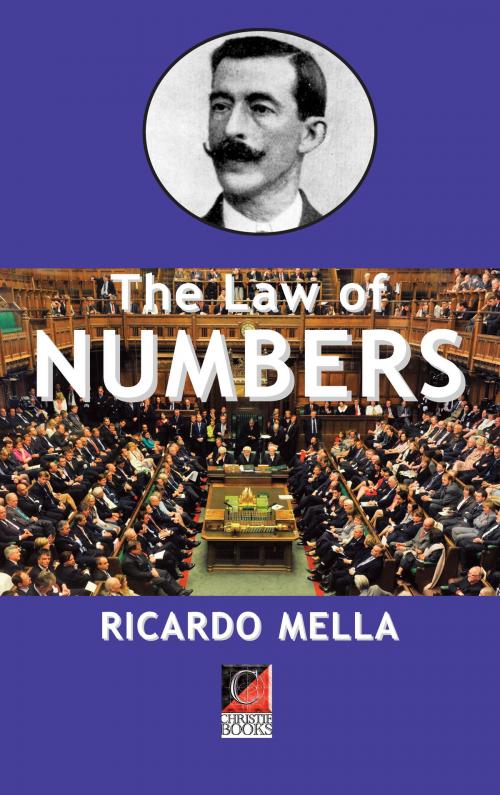THE LAW OF NUMBERS
Nonfiction, History, Revolutionary, Social & Cultural Studies, Political Science, Politics, Practical Politics, European General| Author: | Ricardo Mella, Paul Sharkey (Translator) | ISBN: | 1230000542296 |
| Publisher: | ChristieBooks | Publication: | July 9, 2015 |
| Imprint: | ChristieBooks | Language: | English |
| Author: | Ricardo Mella, Paul Sharkey (Translator) |
| ISBN: | 1230000542296 |
| Publisher: | ChristieBooks |
| Publication: | July 9, 2015 |
| Imprint: | ChristieBooks |
| Language: | English |
Ricardo Mella Cea (1861–1925), one of the first writers, intellectuals and anarchist activists of the late 19th and early 20th centuries in Spain, was considered to be one of the deepest, most penetrating and most lucid of the Spanish anarchist thinkers. In this work he addresses the question of voting and the nature of parliamentary democracy.
Spencer has it that the great political superstition of the divine right of kings has been replaced by the great political superstition of the divine right of parliaments. He goes on to say, “The anointing oil seems to have switched undetected from one head to many, consecrating them and their rights.” Let us take a look at the great superstition which drew such eloquent words from the premier positive philosopher.
Whether we are talking about monarchies or republics, the origin of parliament is the will of the majority, in theory at any rate. At the same time, the supremacy of the greater number rests upon its incontrovertible right to govern everyone, directly or indirectly. The claim is — and the querying of it is scarcely tolerated — that the majority is more far-sighted on every issue than the minority and that, since all men have much in common, it is only reasonable and necessary that the majority should determine how and in what manner general purposes are to be served.
From which flows a series of strictly precise consequences.
The majority among the inhabitants of a country is entitled to regulate the political, religious, economic, artistic and scientific life of society as a whole. Enjoys an all-encompassing right to decide upon all matters and deal with them as its knowledge and understanding suggest. Is entitled to affirm and deny whatsoever it pleases at any point, tearing down one day’s handiwork the very next day. In politics, to lay down the law and rules from which no one is exempt. In economics, it determines and fashions changes, governs production and consumption and enables or rules out cheap living, depending upon how it feels at the time. In religion, it overrules every conscience and imposes dogma on everyone on pain of severe punishment and by means of burdensome taxation. In the arts and sciences, it exercises a monopoly on education and affords the official truth privileged status.
It determines and sets the rules of hygiene and moral behaviour to be observed, which social roles behove the group and which the individual, the conditions in which work is to be done, wealth acquired, assets seized, things altered and persons related to. Finally, to cap it all, it rewards and punishes and acts as accuser, lawyer and judge, an almighty god whose reach extends everywhere, who arranges everything and above all stands guard over everything, watchful and jealous.
There is no exaggeration in these deductions once it has been accepted that the law of numbers is the supreme law.
But, since majorities cannot accomplish so many things unaided, since they cannot possibly handle such a variety of issues on a daily basis, of necessity law and parliamentary delegation pop up to complement it. And indeed, on the basis of majority, delegates or representatives are also chosen who, constituted as a body, assume all of the powers of those whom they represent, or rather of the entire nation, and this is how the omnipotent powers and divine right of parliaments come into being.
And lo and behold, inside these chambers or gatherings of the elect, the radical law of numbers is applied and, on a basis of majority, laws are decreed for the purpose of sage governance of public and private interests, such is the omniscience of the law-makers. Thus do a handful of averagely educated citizens, most often commoners, attain to the grace of supreme wisdom. Hygiene, medicine, jurisprudence, sociology, mathematics, they know it all because the holy spirit of majorities hovers constantly over their heads. That, in all its starkness, is the theory.
Querying of it is regarded as rash, denial of it madness….
Ricardo Mella Cea (1861–1925), one of the first writers, intellectuals and anarchist activists of the late 19th and early 20th centuries in Spain, was considered to be one of the deepest, most penetrating and most lucid of the Spanish anarchist thinkers. In this work he addresses the question of voting and the nature of parliamentary democracy.
Spencer has it that the great political superstition of the divine right of kings has been replaced by the great political superstition of the divine right of parliaments. He goes on to say, “The anointing oil seems to have switched undetected from one head to many, consecrating them and their rights.” Let us take a look at the great superstition which drew such eloquent words from the premier positive philosopher.
Whether we are talking about monarchies or republics, the origin of parliament is the will of the majority, in theory at any rate. At the same time, the supremacy of the greater number rests upon its incontrovertible right to govern everyone, directly or indirectly. The claim is — and the querying of it is scarcely tolerated — that the majority is more far-sighted on every issue than the minority and that, since all men have much in common, it is only reasonable and necessary that the majority should determine how and in what manner general purposes are to be served.
From which flows a series of strictly precise consequences.
The majority among the inhabitants of a country is entitled to regulate the political, religious, economic, artistic and scientific life of society as a whole. Enjoys an all-encompassing right to decide upon all matters and deal with them as its knowledge and understanding suggest. Is entitled to affirm and deny whatsoever it pleases at any point, tearing down one day’s handiwork the very next day. In politics, to lay down the law and rules from which no one is exempt. In economics, it determines and fashions changes, governs production and consumption and enables or rules out cheap living, depending upon how it feels at the time. In religion, it overrules every conscience and imposes dogma on everyone on pain of severe punishment and by means of burdensome taxation. In the arts and sciences, it exercises a monopoly on education and affords the official truth privileged status.
It determines and sets the rules of hygiene and moral behaviour to be observed, which social roles behove the group and which the individual, the conditions in which work is to be done, wealth acquired, assets seized, things altered and persons related to. Finally, to cap it all, it rewards and punishes and acts as accuser, lawyer and judge, an almighty god whose reach extends everywhere, who arranges everything and above all stands guard over everything, watchful and jealous.
There is no exaggeration in these deductions once it has been accepted that the law of numbers is the supreme law.
But, since majorities cannot accomplish so many things unaided, since they cannot possibly handle such a variety of issues on a daily basis, of necessity law and parliamentary delegation pop up to complement it. And indeed, on the basis of majority, delegates or representatives are also chosen who, constituted as a body, assume all of the powers of those whom they represent, or rather of the entire nation, and this is how the omnipotent powers and divine right of parliaments come into being.
And lo and behold, inside these chambers or gatherings of the elect, the radical law of numbers is applied and, on a basis of majority, laws are decreed for the purpose of sage governance of public and private interests, such is the omniscience of the law-makers. Thus do a handful of averagely educated citizens, most often commoners, attain to the grace of supreme wisdom. Hygiene, medicine, jurisprudence, sociology, mathematics, they know it all because the holy spirit of majorities hovers constantly over their heads. That, in all its starkness, is the theory.
Querying of it is regarded as rash, denial of it madness….















